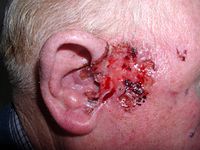
Prognostic significance of three‐tiered pathological classification for microvascular invasion in patients with combined hepatocellular‐cholangiocarcinoma following hepatic resection
Sign Up to like & getrecommendations! Published in 2022 at "Cancer Medicine"
DOI: 10.1002/cam4.5328
Abstract: Previous studies have reported that the microvascular invasion three‐tiered grading (MiVI‐TTG) scheme is a better prognostic predictor than the two‐tiered microvascular invasion (MiVI) grading scheme in hepatocellular carcinoma. This study aims to explore the prognostic… read more here.
Keywords: prognostic significance; combined hepatocellular; three tiered; hepatocellular cholangiocarcinoma ... See more keywords

Mass‐forming intrahepatic cholangiocarcinoma: Can diffusion‐weighted imaging predict microvascular invasion?
Sign Up to like & getrecommendations! Published in 2019 at "Journal of Magnetic Resonance Imaging"
DOI: 10.1002/jmri.26566
Abstract: Microvascular invasion (MVI) is a risk factor influencing the survival rate of patients with mass‐forming intrahepatic cholangiocarcinoma (IMCC). read more here.
Keywords: mass forming; intrahepatic cholangiocarcinoma; forming intrahepatic; microvascular invasion ... See more keywords

Comparison of MRI and CT for the Prediction of Microvascular Invasion in Solitary Hepatocellular Carcinoma Based on a Non‐Radiomics and Radiomics Method: Which Imaging Modality Is Better?
Sign Up to like & getrecommendations! Published in 2021 at "Journal of Magnetic Resonance Imaging"
DOI: 10.1002/jmri.27575
Abstract: Computed tomography (CT) and magnetic resonance imaging (MRI) are both capable of predicting microvascular invasion (MVI) in hepatocellular carcinoma (HCC). However, which modality is better is unknown. read more here.
Keywords: hepatocellular carcinoma; mri; modality better; microvascular invasion ... See more keywords

A Multiparametric Fusion Deep Learning Model Based on DCE‐MRI for Preoperative Prediction of Microvascular Invasion in Intrahepatic Cholangiocarcinoma
Sign Up to like & getrecommendations! Published in 2022 at "Journal of Magnetic Resonance Imaging"
DOI: 10.1002/jmri.28126
Abstract: Assessment of microvascular invasion (MVI) in intrahepatic cholangiocarcinoma (ICC) by using a noninvasive method is an unresolved issue. Deep learning (DL) methods based on multiparametric fusion of MR images have the potential of preoperative assessment… read more here.
Keywords: deep learning; intrahepatic cholangiocarcinoma; microvascular invasion; multiparametric fusion ... See more keywords

Preoperative Evaluation of Gd‐EOB‐DTPA‐Enhanced MRI Radiomics‐Based Nomogram in Small Solitary Hepatocellular Carcinoma (≤3 cm) With Microvascular Invasion: A Two‐Center Study
Sign Up to like & getrecommendations! Published in 2022 at "Journal of Magnetic Resonance Imaging"
DOI: 10.1002/jmri.28157
Abstract: Preoperative evaluation of microvascular invasion (MVI) in small solitary hepatocellular carcinoma (HCC; maximum lesion diameter ≤ 3 cm) is important for treatment decisions. read more here.
Keywords: hepatocellular carcinoma; small solitary; solitary hepatocellular; preoperative evaluation ... See more keywords

IVIM improves preoperative assessment of microvascular invasion in HCC
Sign Up to like & getrecommendations! Published in 2019 at "European Radiology"
DOI: 10.1007/s00330-019-06088-w
Abstract: PurposeTo prospectively evaluate the potential role of intravoxel incoherent motion (IVIM) and conventional radiologic features for preoperative prediction of microvascular invasion (MVI) in patients with hepatocellular carcinoma (HCC).MethodsInstitutional review board approval and written informed consent… read more here.
Keywords: hcc; odds ratio; microvascular invasion; mvi hcc ... See more keywords

Multi-scale and multi-parametric radiomics of gadoxetate disodium–enhanced MRI predicts microvascular invasion and outcome in patients with solitary hepatocellular carcinoma ≤ 5 cm
Sign Up to like & getrecommendations! Published in 2021 at "European Radiology"
DOI: 10.1007/s00330-020-07601-2
Abstract: To develop radiomics-based nomograms for preoperative microvascular invasion (MVI) and recurrence-free survival (RFS) prediction in patients with solitary hepatocellular carcinoma (HCC) ≤ 5 cm. Between March 2012 and September 2019, 356 patients with pathologically confirmed… read more here.
Keywords: hcc; multi; mvi; microvascular invasion ... See more keywords

Microvascular invasion and positive HB e antigen are associated with poorer survival after hepatectomy of early hepatocellular carcinoma: A retrospective cohort study.
Sign Up to like & getrecommendations! Published in 2018 at "Clinics and research in hepatology and gastroenterology"
DOI: 10.1016/j.clinre.2018.02.003
Abstract: BACKGROUND We aimed to identify the independent predictive factors of microvascular invasion (MVI) for curative resection of HCC and to investigate the impacts of MVI and HBeAg on long-term recurrence and survival after resection. METHODS… read more here.
Keywords: group; hcc mvi; patients hcc; microvascular invasion ... See more keywords

Dual energy spectral CT imaging for the evaluation of small hepatocellular carcinoma microvascular invasion.
Sign Up to like & getrecommendations! Published in 2017 at "European journal of radiology"
DOI: 10.1016/j.ejrad.2017.08.022
Abstract: OBJECTIVE To study the clinical value of dual-energy spectral CT in the quantitative assessment of microvascular invasion of small hepatocellular carcinoma. METHODS This study was approved by our ethics committee. 50 patients with small hepatocellular… read more here.
Keywords: hepatocellular carcinoma; invasion; microvascular invasion; small hepatocellular ... See more keywords

Radiomic analysis of contrast-enhanced CT predicts microvascular invasion and outcome in hepatocellular carcinoma.
Sign Up to like & getrecommendations! Published in 2019 at "Journal of hepatology"
DOI: 10.1016/j.jhep.2019.02.023
Abstract: BACKGROUND & AIMS Microvascular invasion (MVI) impairs surgical outcomes in patients with hepatocellular carcinoma (HCC). As there is no single highly reliable factor to preoperatively predict MVI, we developed a computational approach integrating large-scale clinical… read more here.
Keywords: mvi; hepatocellular carcinoma; microvascular invasion; tumor ... See more keywords

Predictive model for microvascular invasion of hepatocellular carcinoma among candidates for either hepatic resection or liver transplantation.
Sign Up to like & getrecommendations! Published in 2019 at "Surgery"
DOI: 10.1016/j.surg.2019.01.012
Abstract: BACKGROUND Microvascular invasion is the strongest prognostic factor of survival in patients with hepatocellular carcinoma. We therefore developed a predictive model for microvascular invasion of hepatocellular carcinoma to help guide treatment strategies in patients scheduled… read more here.
Keywords: invasion; liver transplantation; microvascular invasion; hepatic resection ... See more keywords